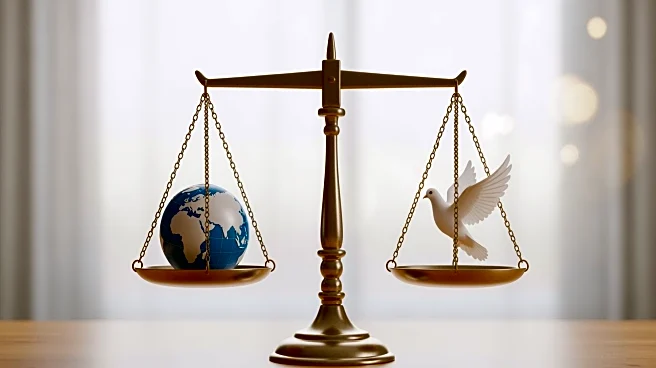What's Happening?
China has refuted claims made by President Trump regarding secret nuclear weapons testing. During an interview on CBS's 60 Minutes, President Trump alleged that both China and Russia are conducting nuclear tests,
which are not publicly disclosed. In response, Chinese Foreign Ministry spokeswoman Mao Ning stated that China adheres to a self-defense nuclear strategy and has suspended nuclear testing. She emphasized China's commitment to the international nuclear disarmament and non-proliferation regime. The U.S. Energy Secretary, Chris Wright, clarified that the U.S. is not planning to resume nuclear detonations but is focusing on system tests that do not involve nuclear explosions. The U.S. has signed but not ratified the Comprehensive Nuclear-Test-Ban Treaty, similar to China and other nuclear powers.
Why It's Important?
The exchange highlights ongoing tensions and mistrust between major nuclear powers, particularly concerning transparency and adherence to international treaties. President Trump's claims and China's denial underscore the fragile state of global nuclear disarmament efforts. The situation could impact international relations and arms control negotiations, as both the U.S. and China play crucial roles in maintaining global strategic balance. The U.S.'s stance on nuclear testing could influence other nations' policies and the future of international treaties aimed at preventing nuclear proliferation.
What's Next?
The U.S. may face pressure to clarify its nuclear testing policies and engage in diplomatic discussions to address concerns raised by China and other nations. The international community will likely monitor the situation closely, especially as the expiration of the New START treaty in 2026 approaches. Potential diplomatic efforts could focus on renewing or establishing new arms control agreements to prevent an escalation in nuclear arms development.
Beyond the Headlines
The debate over nuclear testing touches on broader issues of global security and the ethical implications of nuclear weapons development. The lack of transparency and trust among nuclear powers could lead to increased geopolitical tensions and a potential arms race. The situation also raises questions about the effectiveness of existing international treaties and the need for new frameworks to address modern security challenges.










